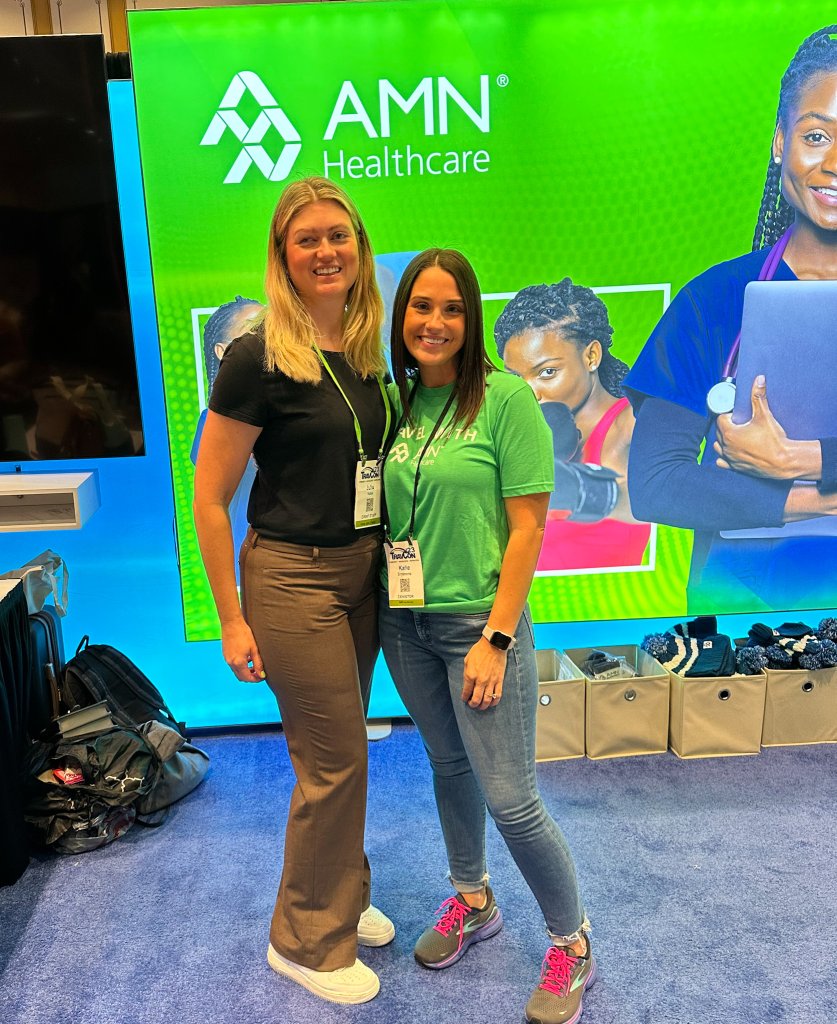Travel speech-language pathologists take short-term contracts across the United States to fill temporary staffing needs.
As a travel SLP, one month you might be working in a skilled nursing facility in Virginia, and the next month doing home health in California.
If this sounds like your dream job, you might wonder how to become a travel SLP.
I’m Julia, and I have 15 years of experience in travel SLP. I’m here to guide you through this journey.
Being a travel SLP has broadened my personal, clinical, and professional horizons. I have worked in six states and over 50 different healthcare facilities across the country. As a travel SLP, I learned about the diverse subcultures in the United States and have learned to become an advocate for myself and my patients.
To say that being a travel SLP changed my life is an understatement. Yet, travel is something I didn’t even know existed until I was a couple of months into my clinical practice. Here are the basic steps you need to follow to become a travel SLP.
Steps to become a travel SLP
- Determine if travel is for you
- Obtain state licensure
- Research the industry
- Connect with recruiters
- Get credentialed
- Job search and submission
- Phone interview
- Accept or decline position
- Onboard with agency
- Move to your assignment
- Start your job!
- Extend your assignment or travel to a new location
We will break those steps down further in this piece.
Determine If Being a Travel SLP is for You

A travel SLP is not just a job, it’s a lifestyle and it’s not for everybody. The SLPs who seem to enjoy travel the most are the ones who are up for an adventure and are flexible in new situations. Every assignment is a new adventure and you are constantly walking into the unknown.
Traveling can be a wonderful way to not only see the country but also to expand your clinical skills and learn from new clinicians across the country.
As a traveler, you will work short-term, temporary assignments that may last anywhere from 13 weeks to a year. Due to the temporary nature of the contracts, you are an at-will employee who can be canceled or replaced anytime. There is not guaranteed work, so you may find yourself without a job.
Employers will also expect you to be clinically independent in your work. While there isn’t a standard minimum experience requirement to be a travel SLP, you will be expected to see your caseload independently with little to no orientation or supervision.
If you are considering being a travel SLP, I would take this time to pause and think about the lifestyle, pros, and cons of travel life. Take a moment to write down goals, both professional and personal, that you have for yourself. Envision where you see yourself in five years. Then, decide if being a traveler fits into those goals and visions for yourself.
If you can see yourself as a traveling SLP and want to learn more, keep reading!
Exploring Joshua Tree National Park while on assignment in Indio, CA
Obtain State Licensure
In a dream world, having an ASHA certification would allow you to work in every state across the country. However, that is not how it works. Even the much-anticipated SLP compact is not slated to cover licensing for all 50 states. Thus, for each state you work in, you need state licensure for that specific state.
States require that you complete their state application. However, you may also need to complete verification letters from every other state in which you have carried a license. The state to state license verification process can take weeks and is completed via snail mail.
Applying for state licensure can be a long process
While some states may turn over an application in as little as a couple of weeks, others can take months. Meanwhile, when a travel job is posted, it may be filled in as little as a day. Thus, you need to have your licenses active if you are planning to apply to travel jobs.
If you are serious about travel and serious about getting a travel position, I would start your journey by getting licensed in multiple states.
I personally recommend that SLPs consider licensure in California. California is a vast state with continual needs for SLP coverage in multiple settings including schools, SNFs, outpatient clinics, and acute care facilities. California is a great license to have and opens the door to many contracts. If there is one state to get licensed in, this is it!
Research the Travel SLP Industry
If you landed on this blog, you may already be researching the travel SLP industry. This website is full of fantastic resources for travelers of all experience levels. I also encourage you to follow my content on Instagram @thetravelingtraveler_ and TikTok @juliakuhnslp to stay up to date on all things travel SLP.
Good reads for all travelers:
- How to Become a Travel Therapist
- How to Find Short-Term Housing
- Understanding Travel Therapy Pay Rates
- How To Find Health Insurance as a Travel Therapist
- How to Find Short-Term Housing for 13-Week Assignments
Connect with Recruiters and Agencies

There are hundreds of agencies that staff travel therapy jobs. Most travelers work with somewhere between 2 to 5 agencies to find the right assignments for them.
For each agency you work with, you will primarily communicate with one individual, your recruiter.
Your recruiter will be your main point of contact for that agency and will present you with jobs and assist you to submit jobs, get interviews, and land assignments.
When finding an agency to work with, it is important to consider not only the agency itself, but also your relationship with the recruiter you’re working with.
When looking for a travel SLP agency/recruiter, here are some things to consider:
- Benefits (e.g. day 1 health insurance versus insurance after 30 days, etc.)
- Communication with a recruiter. The recruiter you work with is your professional tie to the company. Make sure you have a good working relationship and mutual respect with them. Be clear on your communication preferences up front and make sure that you can both work mutually.
- Jobs in a particular location/setting. Some agencies have exclusive contracts with certain facilities and you have a greater selection of jobs working with certain companies. When you are interviewing companies, you can ask them upfront if they have any exclusive contracts in the location or setting that you are interested in.
I’ve worked almost exclusively with AMN Healthcare for the past several years. You can connect with my recruiter, Kalie, here.
What travel SLP agency do I recommend?
To be honest, I’ve worked extensively with so many agencies and have seen a lot of good and bad out there. What works for me may not work for you, and every agency is different.
Some travel SLP agencies cater more towards school SLPs, while others are more medical.
Bigger agencies might be a better fit for certain individuals while smaller ones work better for others.
I’ve personally had a really great experience with AMN Healthcare and my recruiter, Kalie. I’m happy to connect you here.
Get Credentialed With Agencies
Once you find an agency or agencies that you want to work with, the next step is to complete the credentialing process. This process tends to be a bit time consuming, so you only want to do it if you know you are serious about working with an agency.
The credentialing process involves getting all of the required materials together for job submission. This can include sending in copies of state licenses, ASHA cards, BLS certification, vaccination history, a criminal background check, two or three professional references, and a detailed resume of your work history.
By completing the credentialing process, you will be ready for your agency to submit you to assignments.
On assignment in Hawaii
Travel Speech Therapy Job Browsing and Submission
When you are credentialed and ready to go, your agency can submit you to jobs.
Jobs in the travel world can be very hot. Some jobs may open and close in one day, because they have so many candidates submitted.
Others may be kinda stale and linger open for weeks and months.
Because jobs may fill so fast, it is important to have good communication with your recruiter during this time. Your recruiter will be your go-to person to tell you about open job listings. Act quickly by communicating regularly with your recruiter.
When presenting a job, your recruiter should tell you all of the identifying information about that job, such as pay rate, anticipated schedule, location of the facility, name of the facility, and any other important details.
If you are interested in a job, based on a recruiter’s description, then you can agree to submit your application for the position. The recruiter will be the one to submit your file, based on the information you provided during the credentialing process. However, more information may be needed for your job application at this time, so make sure you are in contact with your recruiter.
Travel Speech Therapy Phone Interview
If the facility is interested in your application, you may receive a phone interview with the manager or director of the job. Make the most of your phone interview, this is your only chance to make a good impression to be considered for the position.
The phone interview is also your only time to directly ask questions about the job. You should use the time on the phone interview to ask all of your questions and find out as much about the facility as possible.
About 90% of the time, a job offer will be presented to you on the phone interview. You don’t have to commit to the job over the phone, although it can happen.
If you don’t receive an offer over the phone, you can ask the interviewer why they didn’t present an offer and when you should expect to hear back from them.
Accept or Decline an Offer

If you get a job offer on the phone interview, you want to let your recruiter know ASAP, especially if you are accepting the job. If you are unsure about the offer, you can anticipate having 24 hours to consider an offer. After 24 hours, the position may be offered to somebody else if you haven’t accepted yet. Although, there can always be room for more time, just communicate with your recruiter.
Accepting an offer verbally or written over email is considered the beginning of your contract.
So if you say “yes” make sure that you mean it.
Then, you will get a written copy of your contract to review and sign.
Review your contract carefully to ensure that the information is correct, including start date/end date, any guaranteed hours per week, pay rate, cancellation policy, and requested time off during the contract.
Onboard with the Agency and Facility
When you accept a travel SLP position, you have to complete onboarding requirements for both your agency and the facility you are working for. This can include drug screens, TB tests, vaccinations, a physical, respirator fit test, online competency modules, and more background checks.
Onboarding can take a LOT of time!
If you accept a position, be prepared to act quickly to complete your onboarding tasks. It really feels like a whirlwind to get everything done.
Start Your Job as a Travel SLP!
While it has taken a lot of work to get to this point, now your real work is just beginning. You get to move to your new location and begin work at your new job. For the next 13 weeks you can explore a new area, live like a local, and work in a new building.
Here are some blogs that you may want to read at this step:
Extend or Travel
Time flies while you are on contract. Before you know it, it may be time to start looking for your next assignment (usually about three to six weeks from your end date). Your facility may ask you to extend your time with them and you could extend your contract. Or, you could move on to a new job.
Life as a travel SLP can open up a lot of new opportunities.
Please join my email list to stay up-to-date on my new posts and to receive a free PDF copy of my Crash Course to Travel Therapy Guide. This has lots of tips on how to become a travel SLP. Best of luck on your journey!
Free E-Book & Newsletter
Subscribe to get our latest content and stay up to date by email

I love your website! I’d like to subscribe to your email list and get the PDF for beginners!
Thank you so much for the compliment! You can subscribe to the email list on the bottom of each blog post and on the home page. Hope you enjoy it and the ebook helps out 🙂
Nontraditional grad student here. This is a career choice I would love to consider in a few years when my children are all out of the house. Please add me to your email list so I can keep getting updates on new posts. Thanks for all the great information!
Sounds exciting! You can sign up for the email list on the bottom of the blog pages and on the main homepage. Hope you enjoy the information!
Hi! I am currently in my final year as an undergraduate student in the Speech Language Pathology Program at The University of Akron. I have been looking at grad schools, and was wondering where you went, and if you have any recommendations of where to go to become a travel SLP? Thanks!
Hi, thanks for the questions! I went to Emerson College in Boston. I would recommend going somewhere where you are not going to accumulate a large amount of debt and has plenty of strong externship opportunities. As a traveler, you’ll need to be clinically independent and it helps a lot not to have huge student debt payments to make because your pay is variable.
Hi, I am third speech-language pathology student at a university of fort hare. In south africa, I would like to know whether it possible for me to be a travel speech therapy and do I have to have a masters degree? What advice could you give me for I am interested in working around the worlld and providing my services after my community services year.
Thank you very much
I’m not sure but it will likely depend on where you work and the agreement that your national organization has with that country for license reciprocation
Travelling therapy is really very exciting but I’m not much familiar with this concept. As it’s not very popular here.
Hello!
I wanted to ask whether SLP-A’s can work internationally. I am trying to figure out where I can find more information about this.
Thank you so much! 🙂